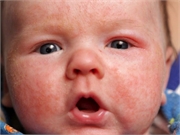Daily use of emollient in first year of life linked to increased risk for skin infections
MONDAY, Feb. 24, 2020 (HealthDay News) — Daily emollient during the first year of life does not prevent eczema in high-risk children, according to a study published online Feb. 19 in The Lancet.
Joanne R. Chalmers, Ph.D., from the University of Nottingham in the United Kingdom, and colleagues tested whether daily use of emollient in the first year could prevent eczema in high-risk children. Term newborns with a family history of atopic disease were randomly assigned (1:1) to either daily emollient (either Diprobase cream or DoubleBase gel) plus standard skin-care advice (emollient group; 693 infants) or standard skin-care advice only (control group; 701 infants) for one year.
Adherence in the emollient group was 88 percent at 3 months of age, 82 percent at 6 months, and 74 percent at 12 months. The researchers found that eczema was present in 23 percent of infants in the emollient group with two-year follow-up data and in 25 percent of infants in the control group (adjusted relative risk, 0.95; 95 percent confidence interval, 0.78 to 1.16; P = 0.61). In year 1, the mean number of skin infections per child was 0.23 in the emollient group versus 0.15 in the control group (adjusted incidence rate ratio, 1.55; 95 percent confidence interval, 1.15 to 2.09).
“Our study shows that families with eczema, asthma, or allergic rhinitis should not use daily emollients to try and prevent eczema in their newborn,” conclude the authors.
Several authors disclosed financial ties to the pharmaceutical industry.
Copyright © 2020 HealthDay. All rights reserved.








